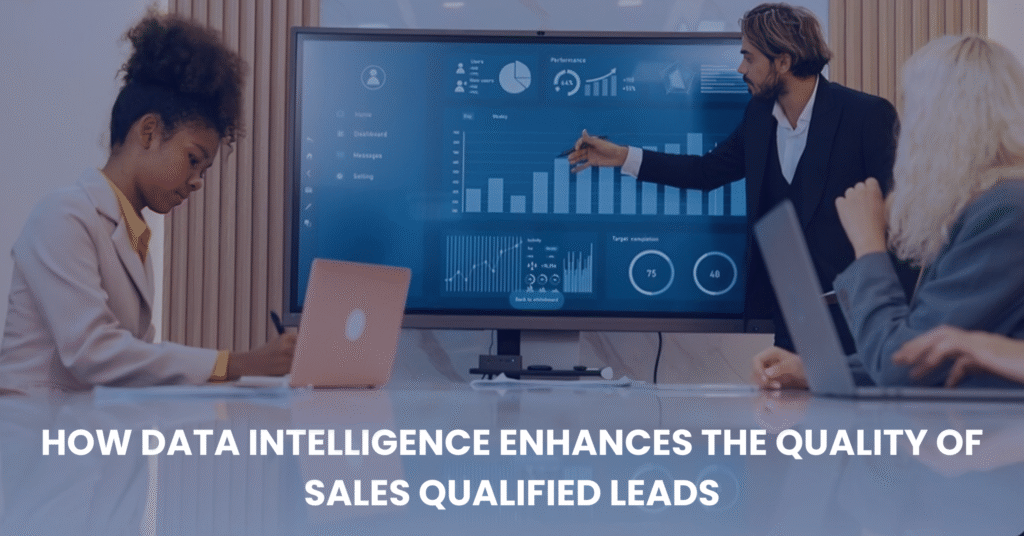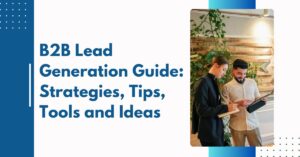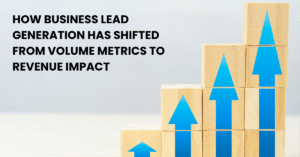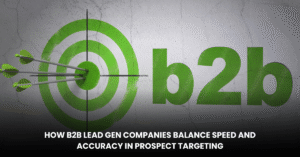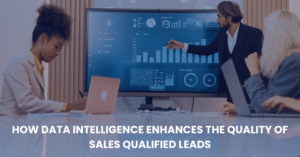Imagine your sales team chases a lead that looks promising on paper but has zero intent in reality! Now, this may be hard to digest. But that happens with most companies. Their sales teams begin accepting low-quality leads as the norm and spend days or even weeks pursuing them, only to be rejected and feel dejected with each effort.
Now, if you’ve been facing a similar situation, you must identify the real challenge.
Your sales and marketing teams are generating hundreds of leads each day. However, they lack the insight that helps them identify those who are worthwhile enough.
This is where data intelligence steps in as the game-changer.
It works from the foundational level, helping you enhance the quality of your sales qualified leads. Let’s understand how.
1. Identifying High-Intent Behavior in Real Time
Whether high or low, sales teams must decode a prospect’s intent in real time.
Delay in identifying high intent can lead to opportunity losses. On the other hand, delays in understanding low intent can waste time. However, the sales team finds itself in such situations when it works with a manual approach.
Data intelligence helps change things by tracking online actions like product page visits, case study downloads, webinar attendance, or repeated visits to product pricing pages.
It helps sales teams identify favorable actions and behaviors that indicate genuine interest, allowing them to prioritize leads actively researching solutions.
2. Aligning ICPs with Real-World Data
ICP, as you would already know, stands for Ideal Customer Profiles.
The lack of data intelligence leads to assumptions that, in turn, lead nowhere.
However, what if instead of relying on assumptions, you can map buyer profiles to enriched data such as revenue, company size, tech stack, and growth stage?
Yes, that’s where data intelligence works its logic and magic. It helps you map your buyer profiles accurately based on real-world data, instead of just instinctive assumptions. The process helps ensure your sales-qualified leads aren’t just interested but the right fit.
3. Auto-Filtering Low-Value Prospects
Of course, not every lead is the same or has the same potential. But when your sales team has nothing but a list of leads, it will end up following up with each, no matter its quality.
Data-driven lead scoring helps you filter out uninterested or unqualified leads automatically. It downgrades them instantly, helping your team focus on and connect with leads with the highest sales potential.
Obviously, the process helps save time on leads with little to no potential to convert. As a result, your pipeline becomes cleaner and more accurate.
4.Unifying Data Across Systems
A disparate or disconnected system is one of the most prominent reasons why many sales and marketing operations fail.
In today’s hyperconnected world, your teams must operate in unison, toward a single objective. Data intelligence ensures that by connecting CRM data, marketing automation platforms, website analytics, and third-party datasets, it provides a unified view.
A single, comprehensive view eliminates blind spots to enable your sales and marketing teams to work on the same updated information with the same lead quality expectations.
5. Predicting Conversion Likelihood
Sales teams often speculate whether a lead will convert, usually based on their instincts. But AI-powered insights help teams make informed predictions. These insights analyze thousands of attributes, firmographic indicators, historical performance, and behavioral signals to predict conversions. Such an AI-based approach also helps teams invest their time and effort where they will achieve the highest returns.
Turn Intent Into Revenue – Partner With DemandFluence Now
6. Providing Conversational Context
Effective sales conversations are usually the difference between a successful sale and an unsuccessful attempt. But with no data on hand, how can sales teams interact effectively?
Data intelligence also transforms interactions. It provides sales teams with rich context like past interactions, previous objections, ongoing requirements, and pages viewed.
Sales experts then have a context to which they can refer to initiate a personalized, meaningful conversation that talks about challenges, solutions, and outcomes.
7. Personalized Messaging at Scale
Generic outreach doesn’t work anymore. Such emails, phone calls, or messages usually land in a lead’s spam box or are deleted the moment they are received.
Data intelligence helps sales experts tailor their messaging strategy based on data-derived pain points, product interests, and urgency indicators.
When leveraged appropriately, personalization works wonders. It makes the content more meaningful, compelling, and action-driven.
8. Continuous Optimization
Data intelligence also helps the sales and marketing teams to track sales-qualified leads that failed to convert. The platform helps them continuously refine their ICP criteria and scoring model, making the qualification process smarter and more accurate.
Don’t Rely on Luck and Instincts. Be Data-Driven. Be Data Intelligent!
A game-changer in every respect, data intelligence can help you enhance your lead quality and close leads quickly and successfully.
So, if you want to harness its power and generate more business through sales conversions, partner with DemandFluence.
We help companies transform their lead ecosystem, helping them drive, tap, and close high-potential leads effortlessly. Please email us at hi@demandfluence.com to connect with our experts.

